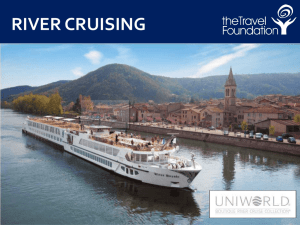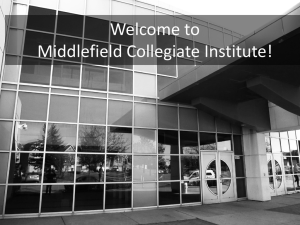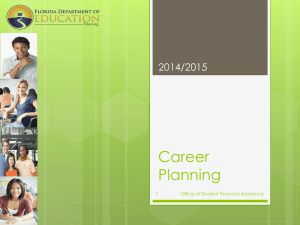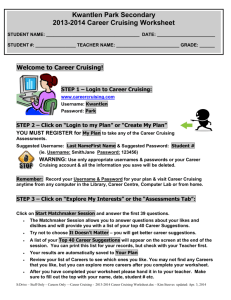Syllabus - Connecticut Regional Vocational
advertisement
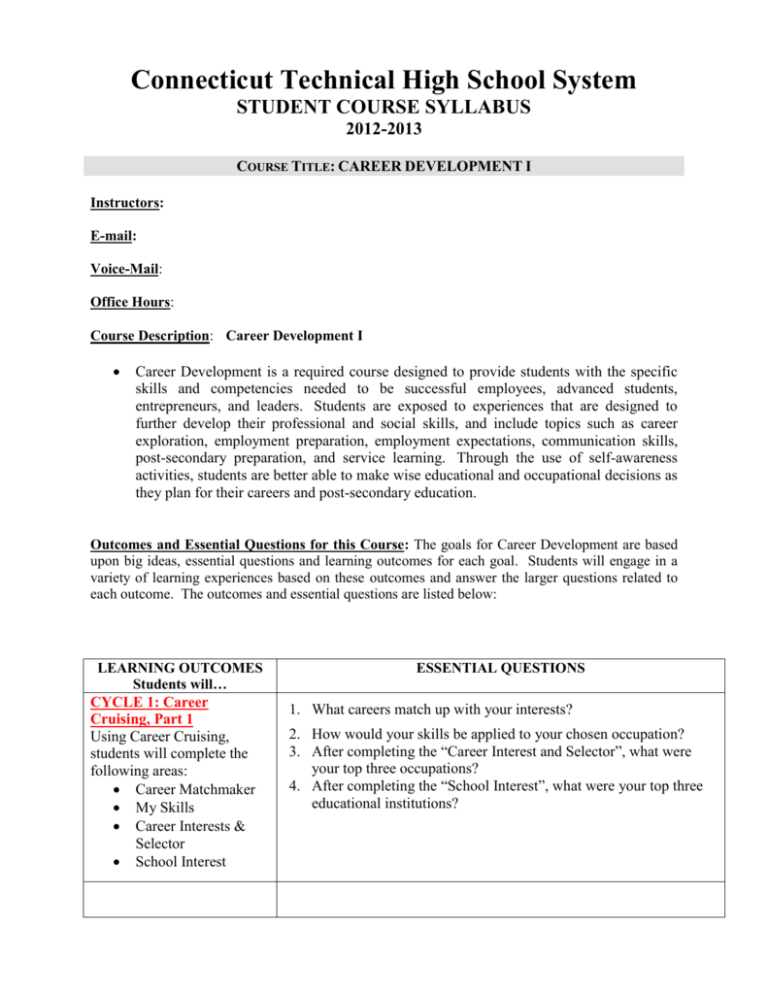
Connecticut Technical High School System STUDENT COURSE SYLLABUS 2012-2013 COURSE TITLE: CAREER DEVELOPMENT I Instructors: E-mail: Voice-Mail: Office Hours: Course Description: Career Development I Career Development is a required course designed to provide students with the specific skills and competencies needed to be successful employees, advanced students, entrepreneurs, and leaders. Students are exposed to experiences that are designed to further develop their professional and social skills, and include topics such as career exploration, employment preparation, employment expectations, communication skills, post-secondary preparation, and service learning. Through the use of self-awareness activities, students are better able to make wise educational and occupational decisions as they plan for their careers and post-secondary education. Outcomes and Essential Questions for this Course: The goals for Career Development are based upon big ideas, essential questions and learning outcomes for each goal. Students will engage in a variety of learning experiences based on these outcomes and answer the larger questions related to each outcome. The outcomes and essential questions are listed below: LEARNING OUTCOMES Students will… CYCLE 1: Career Cruising, Part 1 Using Career Cruising, students will complete the following areas: Career Matchmaker My Skills Career Interests & Selector School Interest ESSENTIAL QUESTIONS 1. What careers match up with your interests? 2. How would your skills be applied to your chosen occupation? 3. After completing the “Career Interest and Selector”, what were your top three occupations? 4. After completing the “School Interest”, what were your top three educational institutions? CYCLE 2: Career Cruising, Part 2 Using Career Cruising, students will complete the following areas: Career Cluster Career Preparation Post Secondary Plan 1. In your chosen Career Cluster, what are your three top related careers in that cluster? CYCLE 3: Career Dev., Part 1 1. Name five types of information provided in a resume. 2. After choosing one of the top related careers in your cluster, identify the following tabs in Career Cruising: Job Description, Working Conditions, Earnings, Education, Sample Career Path, Related Careers, Other Resources and Photos & Interviews (save to “My Portfolio). 2. How are chronological and functional resumes organized? Learn how to write cover, thank you and follow up correspondence including a technical/professional resume. 3. Why is it important that your resume make a good first impression? 4. What information should be included in a cover letter? 5. Why is it important to write a thank you and follow-up letter? CYCLE 4:Career Cruising, Part 3 1. What activities are you involved in during school and/or in your community? If not, what activities do you think you would enjoy? Using Career Cruising, students will complete the following activities: 2. What hobbies or interests are related to your trade and how? Extra Curricular Activities Hobbies & Interests Ability Profiler Skills & Abilities Work Experience Volunteer Experience CYCLE 5: Career Cruising, Part 4 3. After completing, the “Ability Profiler”, what abilities do you have that support your occupational choice? 4. How can you use your production work as work experience on your resume? 5. If you had the opportunity to volunteer, what organization would you choose and/or what volunteer service would you provide? 1. What is the purpose of the job interview? 2. What two items should you bring to a job interview? Using Career Cruising, students will complete the following activity: Interview Skills First Impressions Interview Preparation Interview Questions Tricky Situations Your Rights Communication Skills 3. Name six ways to prepare for a job interview? 4. Why is each of those six ways important? 5. What are the most frequent questions asked at a job interview? 6. Name five questions that are consider illegal to ask during the job interview? 7. Name two examples of what is considered to be inappropriate body language during a job interview and why? 8. List five questions you should ask an interviewer? 9. Names four out of the seven different types of interviews listed on Career Cruising and explain what they are? 10. What points should you be sure you covered before the interview has ended? Questions You Can Ask Types of Interviews Ending the Interview Interview Evaluation CYCLE 6: Career Dev., Part 2 Students will be able to explain why good hygiene and grooming are important at the workplace and will be able to describe what to expect from an employer when beginning a new job. CYCLE 7:Career Dev., Part 3 Students will identify effective communication skills required to be successful on the job and explain the importance of human relations on the job. CYCLE 8:Career Dev., Part 4 Students will explain the roles of employers and workers regarding safety and health in the workplace and figure earnings and deductions from a sample paycheck. . CYCLE 9:Career Dev., Part 5 Students will list the three common types of work based learning experiences and their benefits and describe how to open and manage a checking account. 11. Based on my performance during the interview, would I hire me, why or why not? 1. If you aren’t sure about how to dress on the job, what should you do? 2. List six basic rules for clothing choice wear and care. 3. What can you do to ease the anxiety of starting a new job? 4. Describe what to expect from an employer when beginning a new job? 1. 2. 3. 4. 5. What are the four qualities required to be an effective speaker? Why is good grammar important for job success? What is the major reason why many workers get fired? Identify generational differences in communication styles. Name two ways to get along with co-workers. 1. To which employers do OSHA standards apply? 2. Why are new employees more likely to be hurt on the job than more experienced workers? 3. What is the purpose of completing a W-4 Form? 4. How does an employer determine the amount deducted from your paycheck for Federal Income Tax? 1. How can work based learning experience guide you to discover your career interests and goals? 2. What is the benefit of establishing work experience? 3. What are the two main advantages of having a checking account? 4. What is a mistake people often make with their check registers? 5. How should you endorse a check? CYCLE 10:Career Cruising, Part 5 Students will review and update necessary sections within the Career Cruising portfolio. 1. 2. 3. 4. 5. 6. What are the two parts of the Career Cruising portfolio? What files have been uploaded to your portfolio? What are your top three Career Selections? What are your top three School Interests? What are your top three skills and abilities? What have you learned about your chosen career based upon your findings in Career Cruising?

